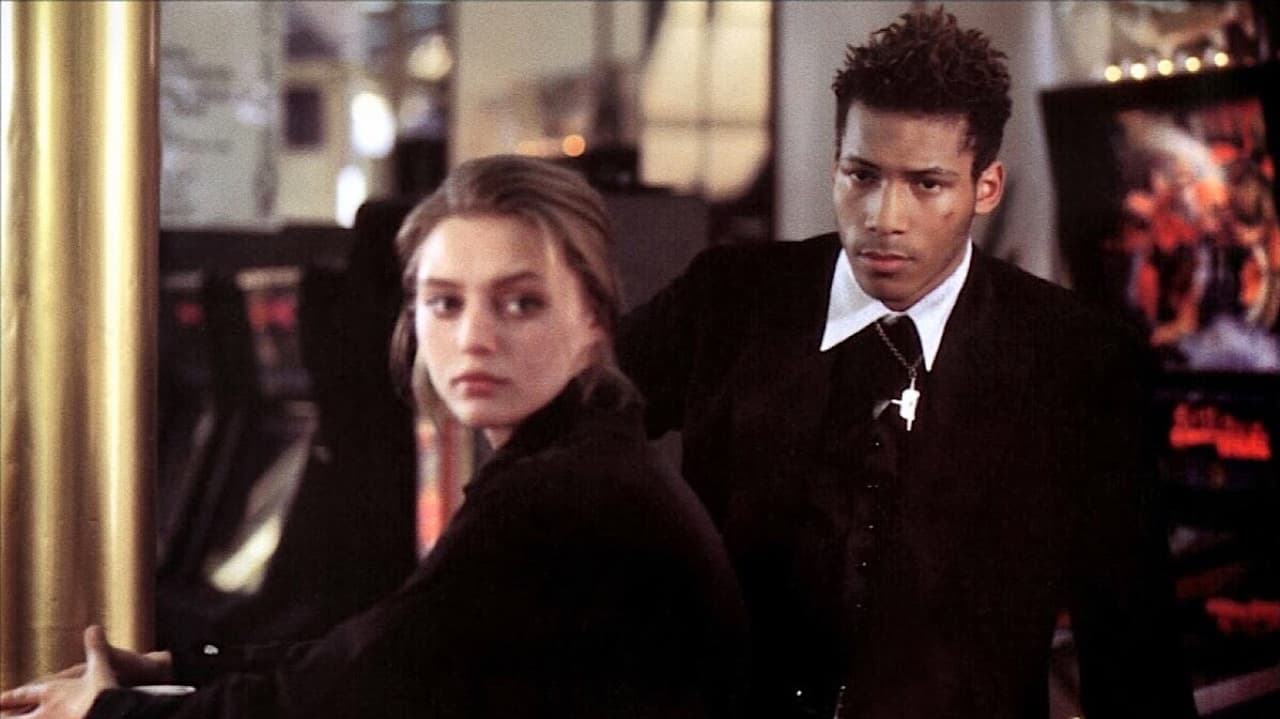

If you want to construe it, this is a maybe difficult film: it definitely is not about gay lady killers,as some want to have it that way. The film juggles at least three stories at once, without any of them being actually central.Yet the, let's say, narrative device is simple as life, as we come to realize at the end. A mysterious young woman, a Lithuanian émigré to Paris, is our entrance and exit to the film, without any of the mystery altered, just enhanced, and peppered by a grim political bottom-line:no one can be central when "you can't sleep" in the metropolitan modern heyday. Even crimes are not, in a -frightening- way, central.The young woman, wanders her life in Paris, exposed to an alien culture (portrayed actually as a semi-culture), going into male-only cinemas to have a laugh (and it is in such scenes that the director seems to lure us into allegorical viewings), meandering in and out of a working milieu while we're not sure that anything touches her, except her car-to-car assault to a director(?)in the street, who slimly proposed to her (a date) after having just rejected her (for the job). And I think yes, she does not care as we see her come in and out of the screen, having worked as a cleaning-lady in a second rate hotel, and consciously robbed one of the residents, a killer. What can one make out of such a character? The film is structured by glimpses and a long traveling of redemption towards the end - so what can our gaze make out of it? Are we witnesses, peeping toms, idle passersby, outlaw onlookers? I would trust in the films suave experimentalism who is not afraid of juggling many elements and somehow does not bother with scenes who would be clean-cut with, or without, narrative function. The film is its own happy dream and insomnia, if there ever was one.Simple as life I said? It is like taking straightforwardly the confession that happens round midway in the film about Martinique being ideal for a nonchalant living, picking fruit from the trees, swimming and fishing all the time and all that. It is the ironies in the film that are hard-boiled and realistic.It seems appropriate to me that the film begins with the Law having one hell of a laugh, in a slightly Hitchckockian scene (as the one in Birds with the legendary God's eye view), yet the from-above does not quite work, for we just get a blurred by the clouds image of Paris.All in all, it is a film worthy of repeated screenings for, as the poet says, "you suddenly spoke out of the margin".
... View MoreClaire Denis' "I Can't Sleep" is a puzzling movie, one that is difficult to grasp because its simplicity makes it so daunting. The story is actually a study of an individual's ability to go about his or her everyday life while terror permeates the surroundings. The central character is Daiga, a Lithuanian woman who has moved to Paris and is looking for a job. As she moves about the city, she gradually begins to notice how the citizens are reacting to a string of murders that has been hyped up in the media; they do not express their fears outwardly, but instead seem a little detached and edgy. As she becomes settled, she begins to meet a few interesting people; they include a considerate landlady, a struggling musician, and two homosexuals who just happen to be the killers.Denis takes a tricky approach to portraying the murderers. She does not condone their actions and clearly does not have too much sympathy for them, but still manages to depict them as ordinary human beings who are driven to desperate crimes because they fail to relate to anything in their environment. She does this by first showing the effect their actions have on the rest of the city, with the newspapers blaring sensational headlines and the citizens reacting by retreating into their homes. But, as the story unfolds, the killers are placed on the same plane as the rest of the characters, and we see their problems, insecurities, and apathy fit in with the day-to-day tedium of their lives. They do not have anyone else to care about, and spend their evenings wandering about the various below-level dives and nightclubs in Paris. It is not until later on that we learn these two men are actually the killers. And when we do discover this, it makes sense in a strange sort of way: their alienation from the rest of society has made them indifferent to everyone but each other. It's almost as if they killed not out of anger, hate, or insanity, but out of boredom.Denis also makes it clear that such crimes have consequences not just for the victims, but for all of society. In the end, it is Daiga, the immigrant who has maintained indifference to the slayings throughout most of the film, who is forced to decide how to expose the criminals. Her `outsider' status gradually diminishes as she realizes that she is the only person who can change the course of events.Still, the drama to the story is not as involving as it could be, and the characters' different stories are not always well balanced. Nevertheless, "I Can't Sleep" is still an intriguing tale about how people often remain indifferent to brutality until it affects them personally.
... View MoreI enjoyed this film that had beautiful images of the male body, and a colorful mix of characters. Although the director, Claire Denis is a straight, white, woman, the film is full of homosexuality images. These images are done artfully however, do not limit the films appeal to a wide range of people. Although a serial killer is loose in Paris, this film is not a classic thriller, in the sense that the viewer does not feel on-edge, and actually might feel comfortable with the killer as did I. I would recommend this film as a good peek at what it is like to be an outsider in Paris.
... View More"I Can't Sleep" opens with a shot of policemen laughing in a helicopter above Paris, a scene Denis says has no narrative function. The helicopter doesn't blow up or crash (as we half-expect, so Hollywood-trained we have become). We never learn why they are laughing, and it never comes up. but it immediately sets a tone of ordinariness about something that is so freighted with allusion - that police work is all dark violence and angst and frayed tension. Police work also includes ordinary moments between two people."I Can't Sleep" follows three sets of characters who come to be loosely linked. First is Daïga (Katerina Golubeva, an unknown with an exotic resemblance to Michelle Pfeiffer) who drives away from Lithuania and into the Paris ring in her boxy, smoking car. She has only vague ideas about what she wants other than to let Paris wash over her life. for the time being, she finds a tenuous niche in the émigré community working indifferently as a maid in a second rate hotel. Among the hotel's residents is Camille (another unknown, Richard Courcet as a drag hoodlum with a brooding boredom) who, with his friends and lovers, leads us through the gay subculture. And there is Theo, Camille's good brother who struggles the struggle of the unFrench emigrant class in neoconservative France. As we stay with these characters, we see a Paris that isn't a backdrop to romantic comedies like "Forget Paris" or "French Kiss." In the course of "I Can't Sleep" we get a sense of the shape of some of the other kinds of lives that are lived in Paris. We begin to move to the film's rhythm. At intervals are arresting set pieces that attenuate reaction. These subtle departures don't break the film's basic form, but they do break the mood of the expected. We get to laugh and be aware that we are laughing. We marvel at small things and know we are marvelling at them.In "I Can't Sleep," newspaper headlines scream about a sociopath who is going around murdering and robbing solitary old women (based on a true case). Denis illustrates for us what we know to be true - that mostly people are unaffected. Everyone's lives continue to be lived routinely, each with their own personal life traumas that fill their days. By chance, the murders intersect our characters' lives and we see their reactions to it. There aren't any obvious cues for us. We watch Daïga as she learns who the murderer is. What she does and what happens as a result is less important than the almost wordless scene they share when she follows him. Something essential passes between them, but what that is is up to you. It's as much based on the experience you can bring to it and what abstractions you can add to the moment. Likewise, Theo's face is a dispassionate mask - it begs us on to project our reactions to his life circumstances.This is a tenuous connection, a lot for Denis to ask of her audience, and it may not engage many or even most of those sitting out there. In a way, you have to have a ready state of mind to watch it. It reminds me most of Kryzysztof Kieslowski's "Red" and the conversations I had about it. More than a few friends said they couldn't suspend their qualms about the believability of the relationship between Jean-Louis Trintignant's character and Irene Jacob's. It was too far from convention (age difference) and lacked a believable basis (he was just a weird old guy, and what did they share anyway?). But for me, I loved it because his character seemed the tragic sum of all the characters I have seen Trintignant play (especially in "A Man and A Woman," "Z," "The Conformist" among others). Here was the same good man, now ruined at an advanced age, and I was meeting him again. I felt I understood him fundamentally, knew what he had gone through to reach this sour moment in his life and because of this, it was easy for me to project my understanding onto Jacob's character. I thought, "Of course she loves him."Anyway, "I Can't Sleep" is, at its best moments, a collage of sometime odd elements that is somehow perfectly composed (like in "Paris, Texas" and "Wings of Desire," and in Kieslowski, especially, "Red" and some of the Dekalog episodes like "Thou shalt not bear false witness"). One can't explain why it seems right, but everyting certainly does feel just right - the film is conjured from single notes that together comprise a whole score. There is what seems like extraneous stuff in there. You wonder how it fits, what it really means. Yet, it nevertheless feels right once the whole has been digested.
... View More